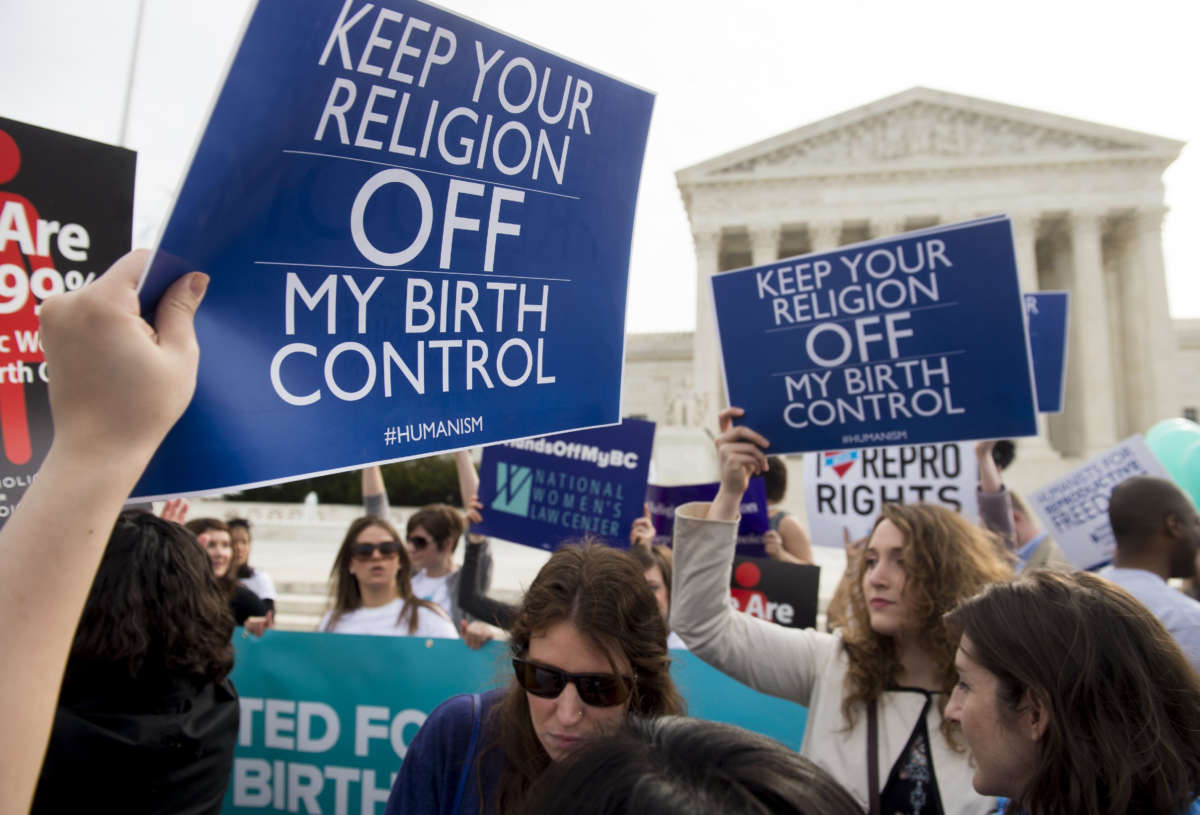Support justice-driven, accurate and transparent news — make a quick donation to Truthout today!
The United States Supreme Court delivered a blow to reproductive rights on Wednesday, siding with the Trump administration in a case that gave employers across the country more leeway in denying contraception to workers if it goes against the company’s morals.
In a 7-2 decision, the Court found that the Department of Health and Human Services was within its authority to create additional exemptions to the Affordable Care Act’s (ACA) contraceptive mandate, which had previously required companies with employer-based insurance plans, with limited exceptions for houses of worship and religious nonprofit groups, to provide contraception to workers without increasing health insurance costs.
The ruling is viewed as a victory for President Donald Trump, who has pushed to expand contraceptive exemptions to private companies, schools, and other groups on the basis of moral or religious objections.
Justice Clarence Thomas, delivering the opinion of the Court, wrote that religious objectors “have had to fight for the ability to continue in their noble work without violating their sincerely held religious beliefs.”
“We hold today that the [Trump administration] departments had the statutory authority to craft that exemption, as well as the contemporaneously issued moral exemption,” Thomas also said.
While the Court’s ruling is viewed as a win for those believing their religious liberties were being violated, it’s being seen as an egregious error in judgment for proponents of reproductive rights. As many as 126,000 people across the country may lose birth control coverage due to the ruling, with many more at risk of losing access to contraception now that the floodgates of exemptions from the Trump administration have been opened.
The ACA originally required most businesses that offered employer-based insurance to its workers to also pay for contraceptive services for them at no additional cost. In 2014, a ruling from the Supreme Court found that businesses like Hobby Lobby, which argued it was a religious-leaning private company, should also be granted exemptions.
The ruling issued this week expanded the possibility that publicly traded companies could also raise moral objections to the contraceptive mandate, if they fit in-line with the rules on exemptions put in place by the Trump administration.
Criticism against the ruling was swift on social media. Planned Parenthood tweeted out that birth control is largely considered “basic, essential health care.”
“And yet: The Supreme Court just ruled that your boss or university can opt out of covering it based on their personal beliefs,” the family planning organization wrote.
“Birth control is a medical necessity. It helps us plan the lives we want, allowing us to choose if and when to have children,” Planned Parenthood wrote in a second tweet.
Lauren Rankin, a freelance writer who often focuses on reproductive rights, echoed those sentiments.
“You have a fundamental right to contraception care and coverage. This isn’t new,” she wrote. “This isn’t even radical. It’s the bare minimum. Contraception is health care and your insurance company should have to cover it. Today’s reckless Supreme Court decision endangers that for millions.”
Former acting Solicitor General Neal Katyal suggested the ruling could be rendered moot, however, if a new administration takes office next year, as the rules on exemptions could be rescinded.
“Notably, the Supreme Court did not say that the Constitution forbids the federal govt from providing contraceptive care — [Justice Samuel] Alito said that but not the Court. So a new Administration can reverse it,” Katyal wrote.
Trump is silencing political dissent. We appeal for your support.
Progressive nonprofits are the latest target caught in Trump’s crosshairs. With the aim of eliminating political opposition, Trump and his sycophants are working to curb government funding, constrain private foundations, and even cut tax-exempt status from organizations he dislikes.
We’re concerned, because Truthout is not immune to such bad-faith attacks.
We can only resist Trump’s attacks by cultivating a strong base of support. The right-wing mediasphere is funded comfortably by billionaire owners and venture capitalist philanthropists. At Truthout, we have you.
We’re in the midst of a fundraiser, and as of right now, we have until midnight to raise $13,000. Please take a meaningful action in the fight against authoritarianism: make a one-time or monthly donation to Truthout. If you have the means, please dig deep.
